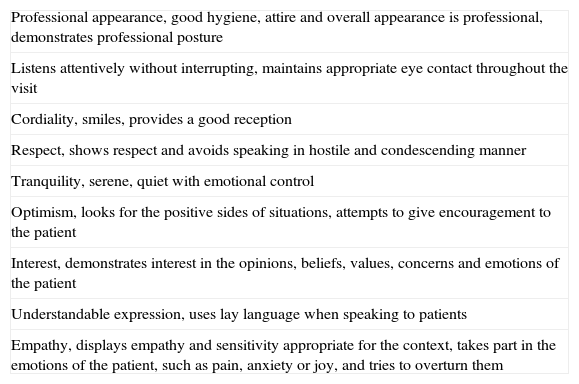Consumption of antibiotics leads to emergence and selection of antimicrobial-resistant bacterial strains which have become a problem in most countries1,2. Despite the fact that antibiotics are considered as prescription-only medicines, these drugs are often requested by and dispensed to patients without a medical prescription in many areas of the world. Despite being illegal, over-the-counter sales of antibiotics still occurs in Spain. The supply of an antibiotic from a pharmacy without a prescription involves a consultation with a pharmacist. From our experience, having good communication skills can help pharmacists to convince patients about the need for not taking some drugs customers ask for. However, research focusing on this aspect is lacking. A prospective study was performed in 2008 in a randomised sample of pharmacies in Catalonia3. Antibiotics were obtained without a medical prescription in 45.2% of the pharmacies surveyed. This study aimed to determine whether pharmacists who sell antibiotics without a prescription have different communication skills from those who refuse to sell them. The methodology of the study has been described elsewhere3. Two actors presented three different cases (sore throat, acute bronchitis, and urinary tract infection) in a sample of 197 pharmacies and asked pharmacists for an antibiotic without a medical prescription. In case that pharmacists refused to sell them the actors collected information about the type of reasons given. A response was considered administrative if the reason given only referred to the regulations or law in that, without a prescription the antibiotic could not be sold. A health-related point of view or comprehensive reason involved the response that it is not good for your health to sell you this medication or antibiotics cannot be given for viral infections or that selling an antibiotic in this case could lead to the spread of drug resistance. The specific skills check-off list evaluated by the simulated patients consisted of nine items, described in table 1, with each ranging from 0 (worst) to 10 (best). The sum of the different items was taken into account.
List of the communication skills evaluated by simulated patients.
| Professional appearance, good hygiene, attire and overall appearance is professional, demonstrates professional posture |
| Listens attentively without interrupting, maintains appropriate eye contact throughout the visit |
| Cordiality, smiles, provides a good reception |
| Respect, shows respect and avoids speaking in hostile and condescending manner |
| Tranquility, serene, quiet with emotional control |
| Optimism, looks for the positive sides of situations, attempts to give encouragement to the patient |
| Interest, demonstrates interest in the opinions, beliefs, values, concerns and emotions of the patient |
| Understandable expression, uses lay language when speaking to patients |
| Empathy, displays empathy and sensitivity appropriate for the context, takes part in the emotions of the patient, such as pain, anxiety or joy, and tries to overturn them |
Information about communication skills was obtained in 195 pharmacies (99%). Of the 108 pharmacies which did not sell antibiotics, 51 pharmacists claimed purely administrative reasons for not selling the drug (47.2%). In the remaining 57 pharmacies, a reasoned and comprehensive response related to health or drug resistance was given (52.8%). The overall mean score of the communication skills was 64.3 (SD=6.8), being significantly higher among those pharmacists who refused to sell antibiotics compared to those who did sell them (65.4 vs. 63.1; p<0.05). Differences were observed in listening, cordiality, tranquility, optimism, and intelligible expression. Among law-abiding pharmacists, the overall mean score observed among those who only gave administrative reasons for not selling antibiotics was significantly lower than those with a reasoned response (61.5 vs. 68.8; p<0.001).
The importance of communication skills for pharmacists has been acknowledged in other papers4,5. However, to our knowledge this is the first report demonstrating that communication skills are slightly better among law-abiding pharmacists, but more importantly, those who only give administrative reasons for not selling antibiotics rate much lower than those who provide an explanation and sound reasoning for their refusal. This paper has practice implications. There is no doubt that effective communication is an important skill for all health professionals. On the basis of the results of this study it is important to carry out studies to determine whether teaching of communication skills addressed to pharmacists enables them to communicate more effectively and confidently. It should also be evaluated whether a teaching program could lead to a reduction in antibiotics sold in pharmacies in areas where over-the-counter sale of antibiotics is still permitted.
Funding body and roleThe Catalonian Society of Family Medicine funded this work. The funder had no involvement in the design and conduct of the study.
Conflict of interestThere are no conflicts of interest to declare.
We wish to thank the actors who participated in this study for their valuable contribution to the field work of this study. The Barcelona College of Pharmacists has been informed about this study.








